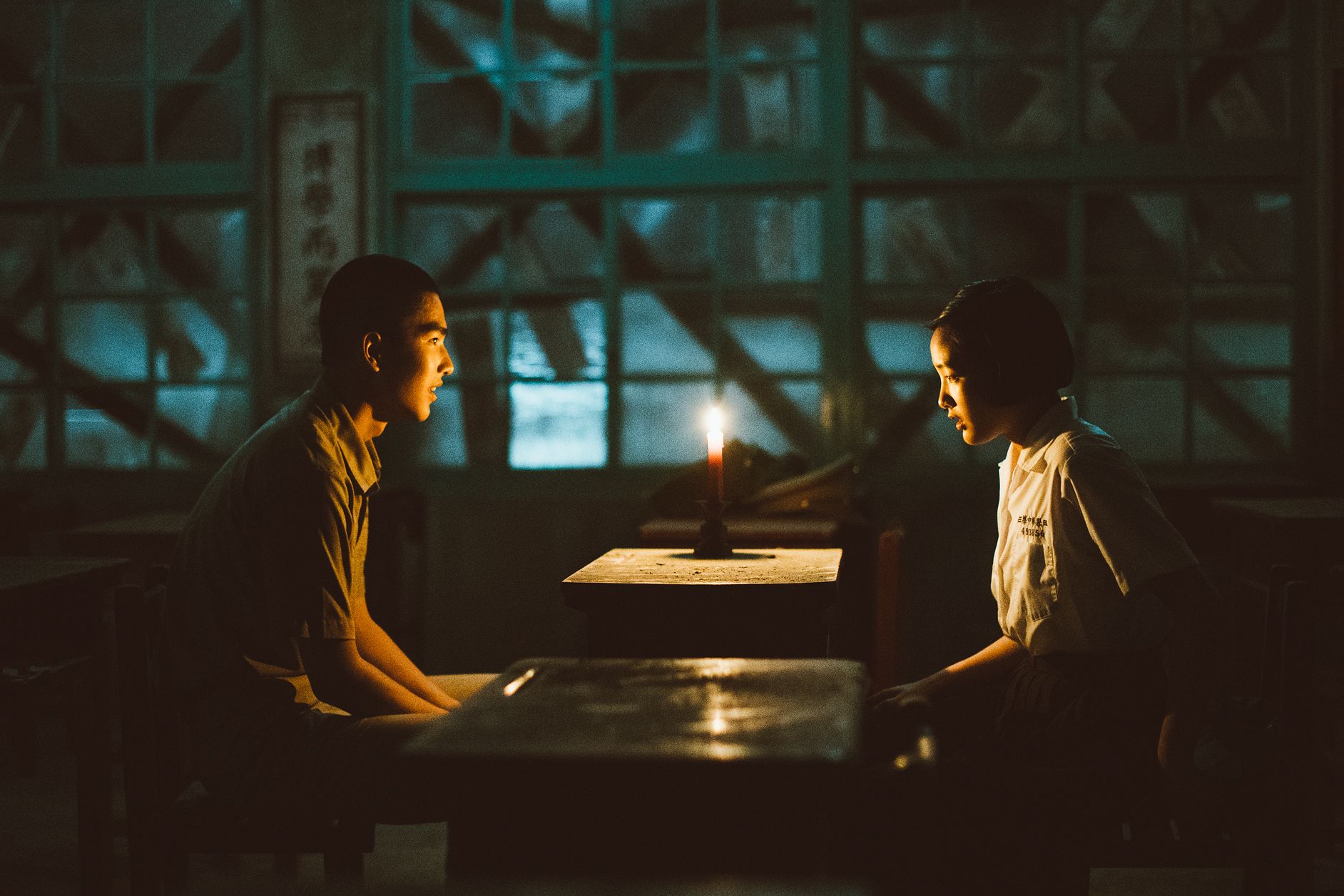What to Watch Verdict
'Detention' channels the more open structure of a quest-by-quest video game universe to enhance the paranormal takeover of an otherwise devastating period-era horror story.
Pros
- +
🕯️ Government as monsters.
- +
🕯️ Translation of joystick thrills.
Cons
- -
🕯️ Too non-linear in spurts.
- -
🕯️ Shaky CGI once or twice.
A wise entertainment journalist once said, "Horror video game adaptations maketh the best video game adaptations." Oh, right, that was me. I've already exhaustively detailed my argument, so let's catch up with the latest example: John Hsu's Detention. Based on a survival horror chiller by Taiwanese developer Red Candle Games, titled the same, that draws similarities to countless titles such as Silent Hill, DreadOut, and other spooky investigative gameplays. Narratives blend the living with the dead, the otherworldly with the earthly, as cinematic qualities translate effortlessly to screen.
In 1962 Taiwan, during the White Terror martial law period, Greenwood High School students Wei (Jing-Hua Tseng) and Fang (Gingle Wang) regain consciousness on school grounds. Rushing floodwaters have wiped away their only exit road. It's a time of imprisonment and oppression, where citizens could face the death penalty just for reading literature deemed "leftist" or "Communist." On campus, Wei participated in a banned books club that was outed and disbanded with extreme prejudice. With Fang's help, Wei must retrace his steps in their hellish schoolhouse purgatory to free the souls lost in their present reality.
Hsu's adaptation is one part supernatural detective story, one part protest against fascism, and always historically reflective. Detention exploits the sins of histories past with the knowledge and hindsight of today, which brings with it a warning given how world leaders haven't fully evolved from levels of god-like egotism in the last fifty-plus years. Hsu's screenwriting team finds horror in the torture of schoolchildren for educational crimes, but also hope in a simple message: someone must survive to witness the salvation of freedom. We sense the fear of systemic tyranny, the anger of watching countries act not for their people, hand-in-hand with a reminder that all campaigns come to an end. It's complete story that never feels imbalanced.
Within the gates of Greenwood High School, in its nightmare state, darkness is illuminated by candlelight as faceless ghouls stroll down paper-strewn hallways. As a representation of militant guards, slender-officer monsters in uniform who speak through radio propaganda snippets stand as tall as Death Note's Ryuk. In reality, Wei's comrades were tortured and assassinated by Inspector Bai's (Hung Chang Chu) squadron, mercilessly.
In Wei's alternate reality, he watches his friends and teachers fall victim to these grisly fates with nooses strung from auditorium rafters. Not to mention the recreation of a scene from the game that involves a slit throat, this time with a book pulled from the wound, that's so grotesquely metaphorical. We're allowed to wince and squeal during the film's haunted school segments that depict cold, unjust murders as these genre heightened deaths. Detention begs the question: which is scarier? Corrupt, oppressive dictatorships, or the imaginative netherworld consequences?
As Fang and Wei inch closer to the truth while confronting ghosts from their past, Detention intertwines betrayals, familial trauma, and the rash decisions that led to someone tattling on the closet-held book club. Teacher Chang Ming-Hui's (Meng-Po Fu) relationship with Fang adds a romantic element. Wei's initial blame on the puppet-obsessed loner Sheng (Chin-Yu Pan) proves an innocent boy received punishment too quickly. Fang and Wei are trapped, questioning why they haven't either passed on or awoke, but the stakes in this already-committed atrocity never weaken because finality has already been achieved. Watching Fang and Wei piece back their shredded reality is just as thrilling as watching their wold fall apart, which is critical. Flashbacks are never a hindrance, and momentum keeps moving forward under the guise of horror cinema. The scales display even weight for most of the duration.
Detention is many things. As Fang scampers through the now ruined backdrop of an otherwise lawful crime against humanity, the camera shakes and jostles like she's a paranormal investigator with apparitions on her tail. As Wei sprints from an advancing stretched-gangly demon with a mission to claim the "rebel's" soul for good, those Silent Hill vibes take over. When cinematography cuts to black and white, showing Chang's renegade collective before their hideaway classroom is discovered, we're suddenly in a period drama where a nation's youth must hide for the offenses of learning and creative passion. Separate, they are executed on varying but all successful levels (CGI isn't perfect). Together, they make a chilling "History Channel gone demented" recollection that pits the horrors of reality against make-believe creatures—always juxtaposing the two, most effective when proving humans as the monsters by way of their predictably immoral actions, yet never without that all-important glimmer of hope. Our suffering, in the face of evil, has to be worth something.
The latest updates, reviews and unmissable series to watch and more!
Matt Donato is a Rotten Tomatoes approved film critic who stays up too late typing words for What To Watch, IGN, Paste, Bloody Disgusting, Fangoria and countless other publications. He is a member of Critics Choice and co-hosts a weekly livestream with Perri Nemiroff called the Merri Hour. You probably shouldn't feed him after midnight, just to be safe.


